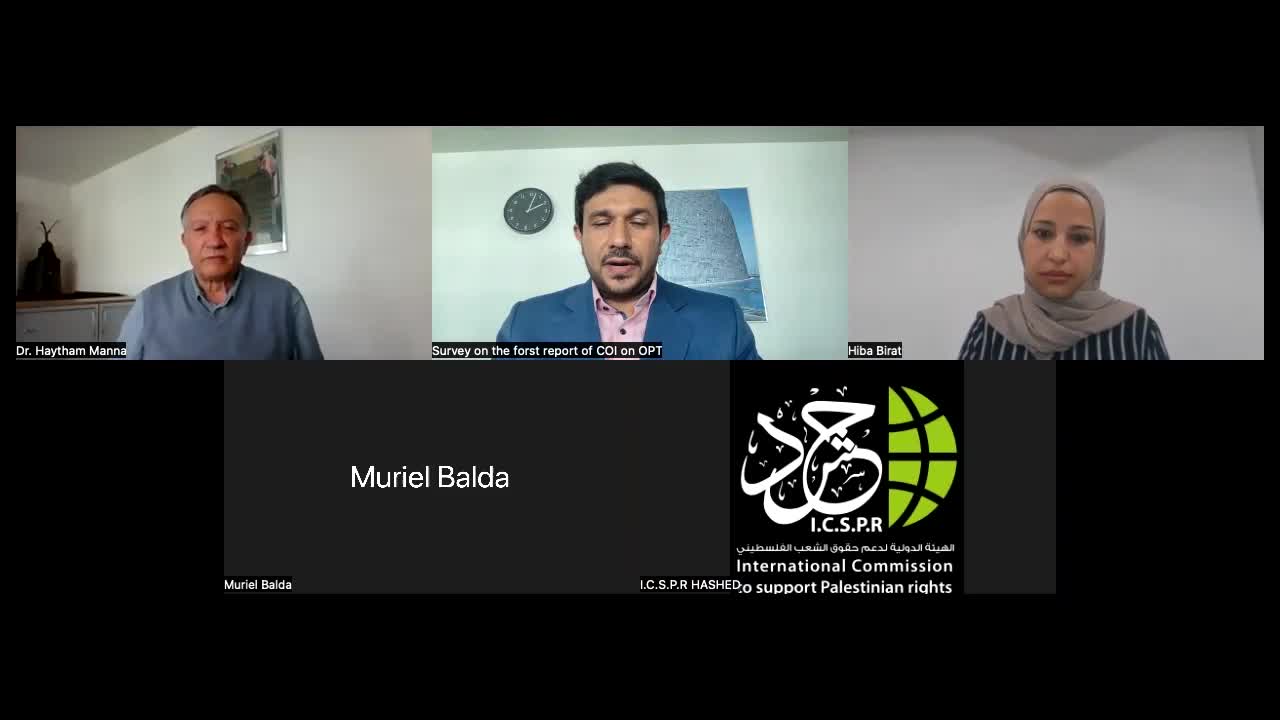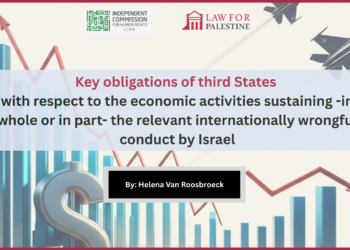Law for Palestine speaks in a webinar about the First Report of COI on Palestine
Hiba Birat, Executive Director of Law for Palestine, has participated in a webinar organized by the Organization for Defending Victims of Violence (ODVV), on the first report of the UN Human Rights Council’s ongoing Commission of Inquiry on Palestine. The webinar was held in English via Zoom on July 6, 2022.
In addition to Ms. Birat, the webinar was attended by Dr. Haytham Manna, President of the Scandinavian Institute for Human Rights, and Dr. Salah Abdel-Aty, President of the International Commission to Support the Rights of the Palestinian People.
Below is the full text of Birat’s presentation, which was linguistically edited by Rachel Marandett, from Law for Palestine team.
* To download the presentation in PDF format, please click here
—
Transcript of Ms. Birat intervention
The first step to addressing any issue is to diagnose it correctly; this was what the UN ongoing Commission of Inquiry (COI) attempted to do in its first report presented to the Human Rights Council (HRC) at its 50th session in June 2022.
Previous UN investigatory bodies, including similar COIs, have conducted somewhat restricted and incidental investigations that omitted the root causes of the enduring violence against the Palestinian People and ultimately contributed to Israeli fragmentation of Palestinians. Conversely, this COI, through its comprehensive mandate, sought to address broad questions that affect the human rights of all Palestinian individuals wherever they reside.
The report has gone further than previous similar reports issued by UN related bodies and mechanisms by adopting a comprehensive approach to Palestine, taking the full context of Palestine into account, and addressing the fragmentation of Palestinian people.
Through its scope, mandate, findings, and recommendations the COI’s first report signals a change in UN’s approach to human rights in Palestine; especially that the UN’s different investigatory bodies have long refused to address human rights of Palestinian people as a whole.
The following points illustrate what makes this report different and more promising than previously issued, similar reports:
- The COI has an unprecedented mandate. Their first report lays outinternational law violations such as settlements, demolitions, dispositions, displacement, the wall, the Gaza Strip blockade that could be seen as causes fueling the ongoing violence and escalation of the conflict. However, the current UN COI is mandated with “investigating root causes of the recurrent tension, instability and protraction of conflict”. So, for the first time, the UN is not focusing solely on piecemeal and temporal issues; rather, it is assessing root causes and wider patterns. The COI is not limited in geography or population either.It is mandated to investigate violations in historic Palestine (both sides of the Green Line) including the West Bank, Gaza Strip, Jerusalem, and Israel. It is also not limited in time, as this is an ongoing investigation.
The recent report highlights perpetual occupation and ongoing discrimination against Palestinians everywhere as root causes of tension, instability, and conflict in the area. It also recognizes that ending the occupation is of the highest priority.
The report did not stop there, however.It went a step further by revealing its forward-looking mandate and the ongoing nature of the Commission’s work by explaining that ending the occupation alone is not sufficient to ending discrimination against Palestinians on both sides of the Green Line. It noted that, instead, further steps must be taken beyond ending the occupation in accordance with international law.
- The report listed ending impunity as a high priority as well. This point is particularly crucial in this critical time because in recent weeks several governments around the world, including the US, have called for an independent investigation into the killing of Shireen Abu Akleh. Sadly, however, instead of supporting the mandate, some states led by the US have accused the Commission of being biased and one-sided in an attempt to shield Israel from scrutiny.
The report highlighted the culture of impunity and the violations of different duty bearers in Palestine, including the Palestinian Authority in the West Bank, the de facto rulers of Gaza Strip, and, mostly, Israel. It also underscored the different duties under international law of third-party states and corporations in this regard.
- The COI has a unique mandate of reviewing previous UN fact finding missions, commissions, and mandates about Palestine. The report found that failure to implement past recommendations led to systematic, recurrent violations across Palestine on both sides of the Green Line.
- For the first time in UN history, this report addressed Palestinian people as a whole. It made important references to Palestinian refugees, indicating that the Commission will seek to engage with wider Palestinian diaspora. This is pivotal because addressing the full context of Palestine requires recognizing the ongoing denial of the right to return as a root cause to the continuous oppression against Palestinians since 1948.
Now, after listing the points of strength in the report and the commission’s mandate, what is missing?
The COI has not yet addressed settler colonialism and apartheid in its first report. However, it did address some of their manifestations such as altering Palestinian demography by displacing Palestinians and replacing them with Israeli settlers. It also indicated the use of discriminatory legislation system on both sides of the Green Line including Jewish nation state basic law and Israeli laws addressing citizenship and entry into Israel.
The COI has not yet addressed settler colonialism and apartheid in its first report. However, it did address some of their manifestations
The report cited Palestine’s accession to the 1973 International Convention on the Suppression and Punishment of the Crime of Apartheid, which signals that apartheid might be part of upcoming reports and analysis.
It is also worth mentioning that the COI’s mandate includes looking into systematic discrimination and repression based on national, ethnic, racial, and religious identity. However, diagnosing the issue using accurate terminology is a must because discrimination is different than apartheid as they entail different legal mechanisms and are treated differently under international law and before the ICC.
Arguments about apartheid are particularly important in the context of growing international consensus that Israel is implementing an apartheid system on Palestinians. This conclusion has been reached by many esteemed international organizations such as Human Rights Watch, Amnesty International, B’Tselem, and others as more and more voices recognize the reality of apartheid for Palestinians in OPTs and in Israel.
The COI will continue examining thematic areas and wider patterns of violations in its upcoming reports. We hope it will keep up with its unprecedented mandate and comprehensive approach while avoiding deficiencies and calling violations by their rightful names.
report Commission Inquiry Palestine





